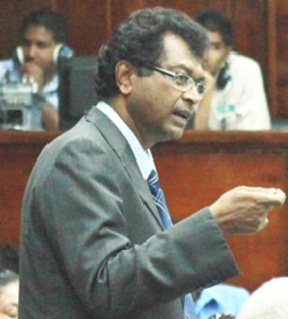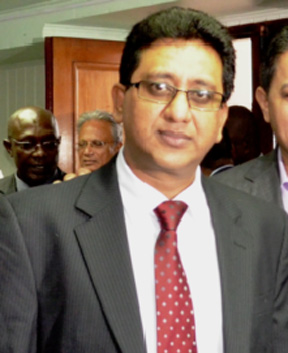AFC leader Khemraj Ramjattan on Tuesday defended the opposition’s scrutiny of the government’s proposed budget as necessary to ensure public spending is beneficial to all.
Addressing the National Assembly on the last day of the budget debate and ahead of the consideration of the budget estimates next week, Ramjattan stated that it was the place of all parliamentarians to take on an active role in the oversight of allocated monies while it is the still the responsibility of the Minister of Finance to deliver the budget.

“We have every right to indicate where we feel money ought to be cut, [or that] money ought to be placed in other areas, so that we can have what we regard too as that which is beneficial to all and sundry in this state and in this country,” he said.
“It is not as if we do not love the people of this country. If we were to say that the monies that are going from NICIL to a Marriott ought to go to a brand new permanent bridge across the Demerara River, what would have been wrong with that? And we are stating that at this stage it might be a better priority than a Marriott,” he added.
He said too that assisting the Private Sector was not out of line with the opposition’s goals and noted that the opposition would lobby alongside the small businesses and entrepreneurs who continuously asked for a reduction in corporate tax. “When it is too high a number of entrepreneurs and businessmen will start hiding,” he warned.
Ramjattan acknowledged that Guyana’s deeply fragmented politics make consensus hard to come by but he nevertheless bemoaned the failure to set up the Public Procurement Commission. “The political leadership of the PPP/C does not want to have the operationalising of a Public Procurement Commission,” he said, while noting such a body would be objective and aimed at corruption reduction.
He argued that the government’s transition from the National Development Strategy to the Low Carbon Development Strategy (LCDS) saw increasing corruption. “There was a transformational shift of the President Jagdeo years’ emphasis on the LCDS—not an entirely bad strategy but it was the front by which there was a number of domestic localized policies and projects which were… riddled with corruption, nepotism, unaccountability and micromanaging,” he said.
This led to “executive lawlessness,” he added, and the widening of the gap between the rich and the poor. He said the focus on the LCDS heralded “employment and educational schemes” that failed to actually develop the “skills people must have now to participate in our economy” and did not bode well for the future. Prior to this shift, Ramjattan further stated, Guyana was on its way to the middle income bracket, which was reflective of the patterns in the Caribbean and Latin America.
According to Ramjattan, Guyana’s wealth and resources could be used to fund a “state development bank” but he added that this was only possible if the Consolidated Fund was being pumped with reserves and those monies “brought to our attention in this honourable house for us to make the allocations.”

He earlier drew attention to “public monies, huge sets of monies in certain bank accounts which the Auditor General had indicated clearly ought to be put into the Consolidated Fund and even huger sums in the [Guyana Geology and Mines Commission’s] account, forestry’s account and the Gold Board account… I had made the point and I want to emphasise it here: these monies need to be put in the Consolidated Fund because they are public monies.”
Meanwhile, Minister of Legal Affairs Anil Nandlall stated that the government was actively updating and modernising systems that would aid in transparency and sectoral development. He noted that it was the opposition’s intention to just slash and cut the budget without hearing the gains that were to be made, which he said was like a form of “political masturbation to these men.”
However, Nandlall emphasised that based on the ruling of acting Chief Justice Ian Chang after last year’s budget cuts, the opposition’s grandstanding was in vain as it cannot legally cut the budget.
“This house is the premier law making institution of the land, this house has therefore the responsibility to ensure that the constitution of the country and the laws of the land are obeyed,” he added, while noting that like with last year’s budget, the courts may need to intervene.
Although the opposition slashed last year’s budget, Finance Minister Dr Ashni Singh later restored some of the allocations based on Chang’s ruling.
However, the opposition has contended that Singh has acted unlawfully as funds restored went beyond what was deemed permissible in the ruling.
The court ruling was a preliminary one and the opposition parties say they are awaiting a final verdict in order to lodge an appeal.





